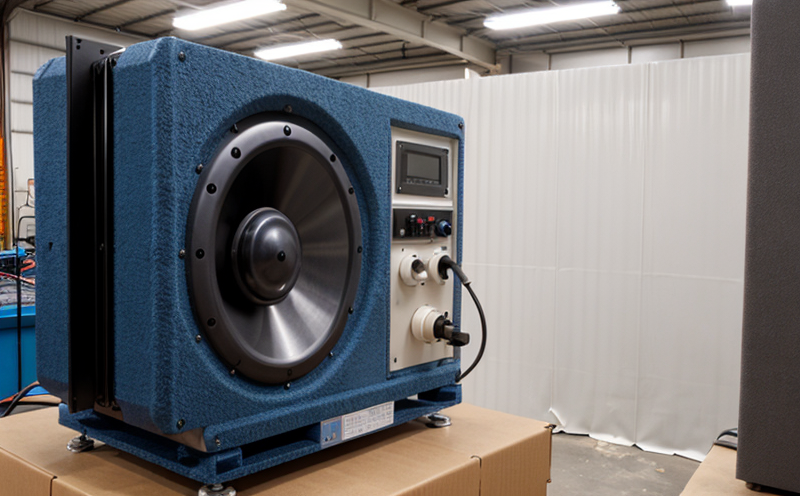IEC 60704-2-21 Electric Grill and Toaster Noise Testing
In today's consumer electronics market, compliance with international standards is not just a regulatory requirement but also an essential factor for maintaining product quality and ensuring customer satisfaction. The International Electrotechnical Commission (IEC) standard IEC 60704-2-21 provides a robust framework to measure the noise generated by electrical appliances such as electric grills and toasters, which directly impacts consumer experience.
The primary goal of this testing is to ensure that products meet the specified limits for noise emissions. Excessive noise can lead to discomfort or even health concerns for users. Compliance with these standards helps manufacturers avoid legal issues and enhances brand reputation by delivering high-quality products. This service ensures that electric grills and toasters adhere strictly to IEC 60704-2-21, thereby meeting the expectations of consumers and regulatory bodies.
The testing process involves several steps, including environmental setup, test equipment calibration, specimen preparation, and data recording. Environmental factors such as room acoustics and background noise must be controlled to ensure accurate measurements. The apparatus used includes sound level meters and octave band analyzers to capture the frequency spectrum of the emitted sounds.
During the testing process, it is crucial to simulate real-world usage scenarios accurately. This involves placing the electric grill or toaster in a controlled environment that mimics typical kitchen conditions. Specimen preparation typically involves ensuring the product functions normally under these simulated conditions before measurement. The data collected during this process includes both overall sound pressure levels and frequency-specific emissions.
The acceptance criteria for IEC 60704-2-21 are stringent, emphasizing not only the absolute noise levels but also their distribution across various frequencies. Compliance with these standards ensures that electric grills and toasters do not exceed the permissible limits set by international regulations. This service provides detailed reports outlining all measurements, comparisons against regulatory limits, and recommendations for any necessary adjustments.
By adhering to IEC 60704-2-21, manufacturers can ensure their products meet global standards, enhancing marketability and consumer trust. This testing not only protects the brand but also ensures user safety by minimizing potential noise-induced discomfort or risk. The service offered here provides a comprehensive approach to meeting these stringent requirements, offering peace of mind for both manufacturers and consumers.
Why It Matters
The importance of IEC 60704-2-21 electric grill and toaster noise testing cannot be overstated in the context of modern consumer electronics. Compliance with this standard is crucial for several reasons:
- Regulatory Compliance: Meeting international standards ensures that products are legally compliant, avoiding potential penalties and legal disputes.
- User Satisfaction: Reduced noise levels enhance user comfort and satisfaction, leading to better product reception in the market.
- Brand Reputation: Consistent adherence to high-quality testing standards can significantly boost brand reputation and customer loyalty.
- Risk Mitigation: By identifying and addressing noise issues early in the development process, manufacturers can mitigate risks associated with potential complaints or returns.
Competitive Advantage and Market Impact
Adhering to IEC 60704-2-21 offers significant competitive advantages that can impact the market positively:
- Global Market Access: Compliance opens doors to international markets where stringent noise regulations are enforced.
- Innovation Encouragement: The standard encourages continuous improvement in product design and technology, fostering innovation within the industry.
- Customer Trust: Consumers trust brands that demonstrate commitment to high-quality standards, leading to increased brand loyalty and customer retention.
Use Cases and Application Examples
| Application Example | Description |
|---|---|
| Testing of Electric Grills | Ensuring that the noise generated by electric grills does not exceed specified limits, thereby enhancing user comfort. |
| Compliance with IEC Standards | Verifying that products meet the stringent requirements set forth in IEC 60704-2-21 for noise emissions. |
| Development of New Products | Identifying potential improvements and innovations by analyzing noise data from prototypes before final product release. |
| Application Example | Description |
|---|---|
| Evaluation of Toaster Noise Levels | Assessing the noise generated by toasters during operation, ensuring it does not interfere with daily activities. |
| Field Testing in Real Environments | Conducting tests in simulated kitchen environments to accurately measure and compare noise levels under various conditions. |





